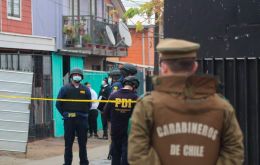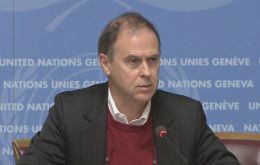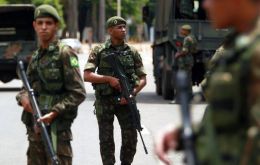MercoPress. South Atlantic News Agency
Tag: security
-
Saturday, April 8th 2023 - 10:17 UTC
Chilean Gov't to create a Security Ministry?

Chile's Interior Minister Carolina Tohá held a meeting Friday with the Speakers of both Houses of Congress to discuss concrete measures in the aftermath of the slain of three police officers. Senate Speaker Juan Antonio Coloma spoke of “a powerful effort by all” ahead as agreements between the Executive and the Legislature are to be reached. In addition to Lower House Speaker Vlado Mirosevic, the meeting was also attended by Justice Minister Luis Cordero.
-
Monday, June 6th 2022 - 10:29 UTC
Lacalle Pou: “it is not true that security has worsened” in Uruguay

Uruguayan president Luis Lacalle Pou addressed on Sunday public security and replied to criticism from opposition left-wing party Frente Amplio’s (Broad Front).
-
Tuesday, May 17th 2022 - 09:46 UTC
Security becomes a concern for Chile's gov't

Chile's Minister of the General Secretariat of the Presidency, Giorgio Jackson, Monday admitted the Government was reviewing security measures to be taken in the future following a robbery at the home of Defense Minister Maya Fernández and a shooting against one of President Gabriel Boric Font's bodyguards.
-
Saturday, July 4th 2020 - 07:15 UTC
UN questions as “vague and overly broad” Hong Kong's national security law

The UN human rights office voiced concern on Friday that “vague and overly broad” provisions in the national security law for Hong Kong may lead to arbitrary interpretation and prosecutions of activists in violation of freedoms of assembly and expression.
-
Tuesday, January 7th 2020 - 09:42 UTC
Argentina boosts security as US/Iran conflict escalates

Argentina’s government boosted security at its airports, borders and the U.S. Embassy in Buenos Aires as tensions simmer between the United States and Iran, the Argentine defense minister told local media on Monday.
-
Wednesday, May 8th 2019 - 09:58 UTC
Bolsonaro signs decree making it easier to own, carry and import weapons

Brazil's President Jair Bolsonaro signed a decree on Tuesday making it easier for gun enthusiasts to own, carry and import weapons in one of the world's deadliest countries. Beaming members of Congress and industry lobbyists clapped and made pistol signs with their hands as the ex-army captain relaxed rules that critics fear could pave the way for the carrying of weapons in the streets.
-
Monday, April 22nd 2019 - 08:34 UTC
Record violence and killings in Mexico in the first quarter: 8.943 murders

Violence in Mexico hit new heights in the first quarter of 2019, with 8,493 murders recorded from January to March, according to official figures. According to the Executive Secretariat of the Public Security National System, that number represents a 9.6% rise on the same period in 2018.
-
Monday, February 18th 2019 - 09:44 UTC
Argentine Security minister making headlines with her tough on crime policy

Argentina's government, with one eye on elections later in the year, is getting tough on crime, and one figure is taking centre stage: the country's security tsar. Patricia Bullrich, 62, the security minister, is pushing a series of new tough-on-crime measures, including dropping the age for juvenile convictions, equipping cops with stun guns and trialling facial recognition at train stations.
-
Tuesday, January 22nd 2019 - 10:11 UTC
Brazilian government trying to recover control over its overloaded prison system

Police and soldiers are being deployed in large numbers to Brazil's northeast to fight a wave of gang violence fueled by the overloaded, collapsing prison system. More than 400 elite federal troops have been sent to the city of Fortaleza and the rest of Ceara state to reinforce overwhelmed local cops, who face a dramatic rash of attacks on government buildings, buses, police stations, banks and bridges by well-armed gang members.
-
Monday, January 7th 2019 - 09:23 UTC
Organized crime challenges Bolsonaro despite deployment of federal forces

The attacks and fire-bombings sweeping Brazil's northeastern state of Ceara continued unabated Sunday despite the deployment of at least 300 members the elite, military-style National Police Force to help bring an end to the violence.
